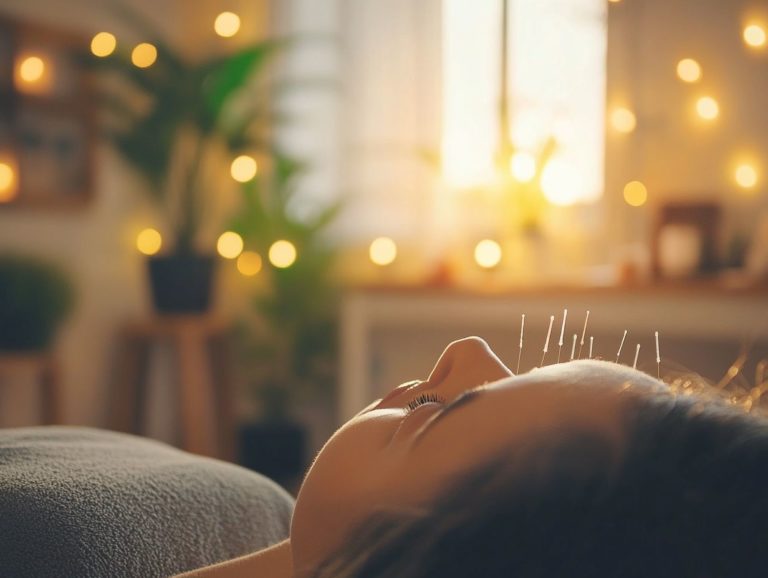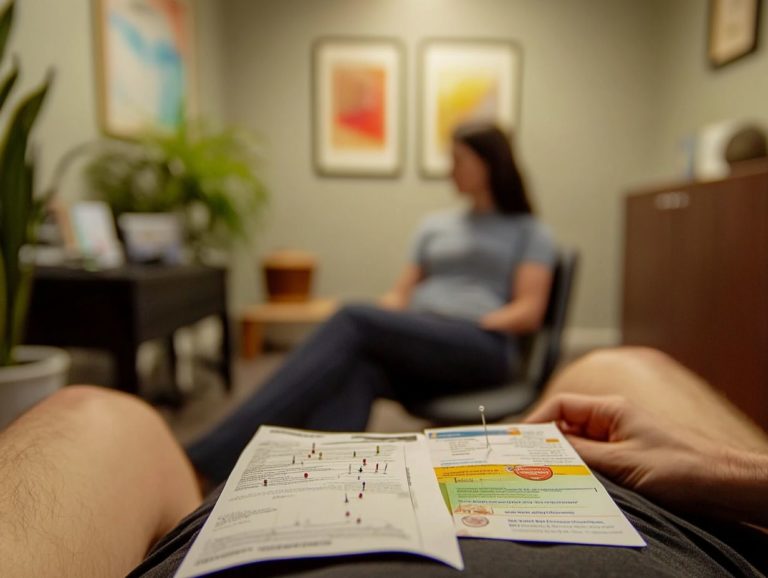Exploring the Connection Between Acupuncture and TCM
Traditional Chinese Medicine (TCM) provides a holistic way to health by combining acupuncture, herbal medicine, and dietary therapy. At the core of TCM is acupuncture, an ancient practice that employs fine needles to stimulate specific points on the body.
This article delves into the philosophy and principles of TCM, tracing the rich history and practice of acupuncture. You’ll discover the benefits it offers for various conditions and insights into its safety based on the latest research.
It also looks at how acupuncture works well with other TCM treatments like herbal medicine and dietary therapy.
Join us to see how acupuncture can boost your health and change the way you feel!
Contents
- Key Takeaways:
- The Basics of Traditional Chinese Medicine (TCM)
- What is Acupuncture?
- How Acupuncture is Used in TCM
- Benefits of Acupuncture in TCM
- Safety and Effectiveness of Acupuncture
- Combining Acupuncture with Other TCM Practices
- Frequently Asked Questions
- What is the connection between acupuncture and traditional Chinese medicine (TCM)?
- How does acupuncture fit into TCM?
- Can acupuncture treat any health condition?
- What should I expect during an acupuncture session?
- Are there any side effects of acupuncture?
- How many acupuncture sessions are needed to see results?
Key Takeaways:

TCM is a holistic medical system rooted in the philosophy of balance and harmony.
Acupuncture is a key part of TCM. It uses fine needles to stimulate specific body points, helping to restore balance and promote healing.
Acupuncture has been used for thousands of years in TCM to treat a wide range of conditions, including pain, digestive issues, and emotional imbalances. Its effectiveness has been supported by both traditional knowledge and modern research.
When used with other TCM treatments like herbal medicine and dietary therapy, acupuncture can enhance their benefits and create a more comprehensive healing approach. This combination allows for a personalized treatment plan tailored to individual needs.
The Basics of Traditional Chinese Medicine (TCM)
You ll discover that Traditional Chinese Medicine (TCM) offers a holistic approach to health. It weaves together practices such as acupuncture, herbal medicine, and dietary therapy.
Grounded in ancient philosophy, TCM focuses on balancing qi, which means life energy, within your body. It targets specific points to restore harmony and improve wellness.
Rather than simply addressing symptoms, TCM delves into the root causes of ailments. This fosters health maintenance and allows your body s natural healing processes to flourish.
Philosophy and Principles
The philosophy of traditional Chinese medicine (TCM) is deeply intertwined with the concept of qi flowing through your body along specific pathways known as meridians. This vital energy influences not just your physical health but also your emotional and mental well-being, making its balanced flow essential for overall harmony.
When there are blockages or imbalances in your qi, various health issues can manifest. This underscores the importance of practices like acupuncture, which seeks to restore this flow by stimulating specific points along the meridians.
Techniques such as tai chi, herbal medicine, and thoughtful dietary adjustments play a crucial role in preventing disease and maintaining your vitality.
Start nurturing your qi today to boost your health and resilience against illness!
What is Acupuncture?
Acupuncture stands as a cornerstone of traditional Chinese medicine. The delicate insertion of fine needles at precise points on your body seeks to harmonize the flow of energy, or qi.
This time-honored practice is celebrated for its potential to ease chronic pain, diminish anxiety, and enhance overall wellness. It provides a sophisticated complement to contemporary medical treatments.
History and Practice
The history of acupuncture stretches back thousands of years. It is deeply rooted in the practices of traditional Chinese medicine and was developed as a method for diagnosing and treating a variety of ailments, including chronic pain.
Over the centuries, this ancient technique evolved from a localized practice in China into a globally recognized form of therapy. It gained legitimacy as practitioners began meticulously documenting their methods and results.
As modern healthcare progressed, acupuncture increasingly integrated with conventional medical practices, leading to a harmonious blend in patient care. This transformation has been bolstered by a growing body of scientific research validating its efficacy.
Contemporary acupuncture treatments place great emphasis on thorough patient evaluations and personalized treatment plans. This ensures that the unique needs and experiences of each individual are acknowledged and addressed.
Such a holistic perspective enhances the effectiveness of the therapy and cultivates a deeper connection between practitioners and patients, bridging the gap between ancient wisdom and modern medicine.
How Acupuncture is Used in TCM

In traditional Chinese medicine, acupuncture stimulates precise points in the body. This practice encourages the flow of energy and enhances overall health.
Key Concepts and Techniques
Key concepts in acupuncture focus on manipulating these points to adjust the flow of qi, or vital energy. This approach restores balance and alleviates chronic pain.
These points are located along the body s meridians and relate to various organ systems. Each point has a specific purpose, from relieving stress to boosting immunity.
Practitioners use various techniques, including needle insertion, acupressure, and electro-acupuncture. They tailor these methods to your unique symptoms and health profile.
By assessing your condition, acupuncturists can choose the most effective treatment. This personalized approach addresses both physical and emotional concerns.
Benefits of Acupuncture in TCM
The benefits of acupuncture in traditional Chinese medicine are extensive. You can enjoy effective pain management and overall wellness.
Acupuncture is appealing for those seeking alternatives for chronic pain, anxiety, and depression.
Common Conditions Treated
Acupuncture is a powerful tool in your wellness arsenal. It effectively addresses conditions such as chronic pain, anxiety, and even fibromyalgia.
This ancient practice has integrated into modern medicine, backed by numerous studies. Research shows acupuncture’s efficacy in treating various ailments.
For instance, the Journal of Pain reports significant relief for individuals with chronic back pain after regular acupuncture sessions. Those with anxiety and depression often see improvements in managing stress.
Patients frequently share positive experiences during treatments. Many report a heightened sense of well-being afterward.
Case studies reveal that fibromyalgia sufferers often find reduced pain levels and improved sleep. Acupuncture offers holistic solutions for health challenges.
Safety and Effectiveness of Acupuncture
The safety and effectiveness of acupuncture have been thoroughly researched. When administered by qualified practitioners, it is generally safe with minimal side effects.
Research and Evidence

Numerous studies have shown acupuncture effectively relieves chronic pain. It also enhances your quality of life.
These studies cover conditions like osteoarthritis, migraines, and low back pain. They reinforce that acupuncture alleviates discomfort and promotes well-being.
Researchers highlight patient-reported outcomes, showing changes in pain perception and daily functioning. These insights are essential to understanding how acupuncture works physiologically.
By examining patient experiences, healthcare professionals can improve acupuncture treatments. This helps optimize results and address specific symptoms.
Combining Acupuncture with Other TCM Practices
Combining acupuncture with other TCM practices, like herbal medicine and dietary therapy, unlocks many benefits. This integrated method enhances treatment effectiveness and promotes balance in your life.
Herbal Medicine and Dietary Therapy
Herbal medicine and dietary therapy are key parts of traditional Chinese medicine. They work with acupuncture to boost your wellness and enhance treatment benefits.
This holistic approach helps you achieve a balanced state of health. Each component fits together beautifully.
For example, ginger and ginseng are known for their warming properties. They aid digestion and provide an energy boost.
In colder months, dietary practices recommend incorporating warming foods to fend off illness. If you’re dealing with fatigue or digestive issues, try adding mung beans or goji berries to your meals.
These nourishing ingredients can replenish your body’s vital energy and improve the effectiveness of your acupuncture sessions.
Frequently Asked Questions
What is the connection between acupuncture and traditional Chinese medicine (TCM)?
Acupuncture is a vital part of TCM, a holistic healthcare system from China that has been around for thousands of years. It aims to balance the flow of energy, known as “qi,” in the body to promote health and well-being, reflecting the principles outlined in understanding the philosophy behind acupuncture.
How does acupuncture fit into TCM?

It works alongside herbal medicine, dietary therapy, and mind-body practices like tai chi and qigong. Acupuncture helps regulate the flow of qi and restore balance, addressing the root causes of illness.
Can acupuncture treat any health condition?
Yes! Acupuncture can help with a wide range of health issues, both physical and emotional. It s commonly used for pain relief, digestive problems, respiratory issues, and mental health concerns.
Always consult a licensed acupuncturist for a personalized treatment plan that suits your needs.
What should I expect during an acupuncture session?
Your acupuncturist will start with a thorough health assessment to determine the best treatment. Then, they will insert fine needles into specific points on your body to help regulate qi.
Many people find acupuncture to be a relaxing and rejuvenating experience!
Are there any side effects of acupuncture?
Acupuncture is generally safe and non-invasive. Some may experience slight bruising or soreness where the needles are inserted, but this usually goes away quickly.
Choosing a licensed and experienced acupuncturist can minimize any risks.
How many acupuncture sessions are needed to see results?
The number of sessions varies by individual and condition. Some people feel relief after just a few sessions, while others may need ongoing treatments.
Acupuncture often works best when combined with other TCM practices and healthy lifestyle changes.






